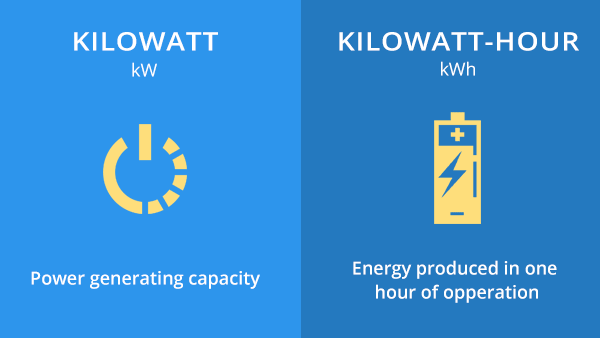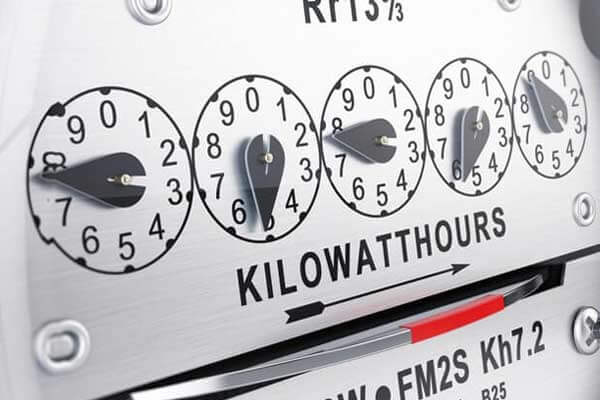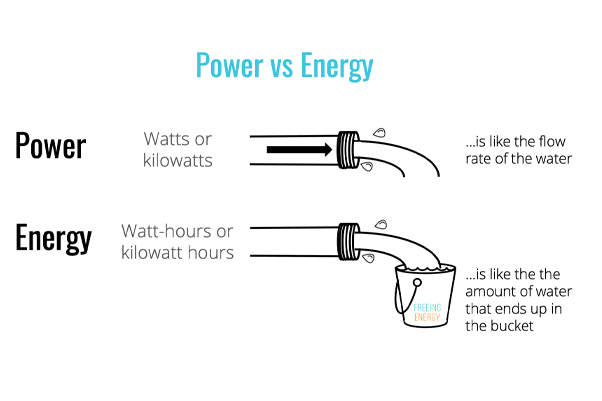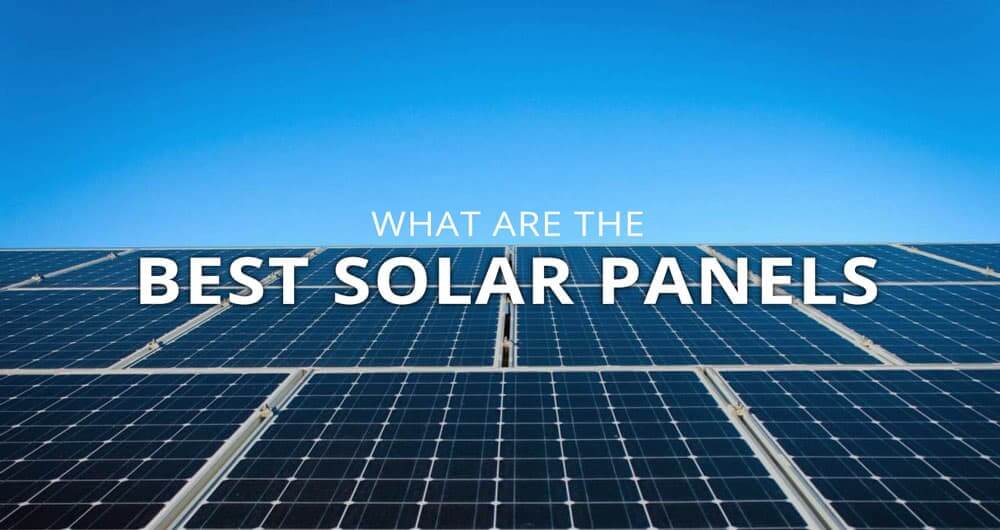When you delve into the world of solar energy, you’ll inevitably come across the terms kW and kWh. Without a basic understanding of electrical concepts, these terms can certainly be perplexing.
A kilowatt (kW) is the power generating capacity and a kilowatt-hour (kWh) is the power generated over one hour.
Let’s take a closer look at both measurement standards below.

Table of Contents
ToggleWhat is a kilowatt-hour?
A kilowatt-hour or kWh is simply a measure of the energy consumed. From this abbreviation, the ‘k’ stands for kilo, which means 1000. The ‘W’ stands for watts – a unit of power, and the ‘h’ stands for an hour – a measure of time.
So, a kWh refers to the amount of 1000 watts of energy your household consumes per hour. The total output energy produced by a solar system, as well as the amount stored in solar batteries is measured this way.
To calculate the kWh your solar panel produces. Here’s a simple formula;
kWh = Total Watts x Time(hours)
So, if your solar system produces 15kW of power consistently over one hour, its total output for the hour will be:
= 15,000 x 1 = 15 kWh
The average energy consumption for most Australian homes hosting 4-5 persons is 23kWh per day.
What’s the difference between a kW and kWh?
kW, or kilowatts, refers to a unit of measuring the amount of power generated by your solar system.
Each solar system comes with its maximum defined peak power rating, e.g., a 5kW solar system can produce a maximum of 5kW of power at peak sunlight conditions. If the system generates the same output for 3 hours, the system generates 15kWh.
This means that if you need your solar system to generate more energy for your home, you don’t need a larger solar system size. You only need to ensure that your small solar system receives more daylight hours.
From the definitions above, the main difference between kW and kWh is what they’re measuring. A kW is a unit measuring power, while kWh measures energy.

What’s the difference between energy and power?
Although most people use these terms interchangeably, there’s a huge difference between power and energy.
Power refers to the rate at which your solar system generates electrical energy at any one time. It’s usually measured in Watts, but with solar systems and batteries, it’s measured in kilowatts, i.e., kW or 1000 watts.
This is usually the rating on any solar system you purchase. A 6kW system means that its peak power under adequate sunlight is 6kW – but practically, the output will always be a bit lower due to the unavoidable losses.

Energy, on the other hand, refers to the total power consumption over a specified period of time – usually an hour. It’s measured in kilowatt-hours or kWh.
This is the total power you can use at your home, and it’s what your utility company uses to determine your monthly bill. For instance, assuming you have two 100-watt light bulbs, if they run for 5 hours, they’ll consume 1 kWh of energy.
With solar systems, energy is the amount of power your solar system generates throughout the day. If it produces 2kW over 5 hours, the energy production for that day will be 10kWh.
Knowing this difference comes in handy when you’re selecting your solar system size. If you confuse the power rating with your energy demands, you may end up with a larger-than-needed solar system which is more expensive.
Why are solar systems sold in kW and not kWh?
As you know, all manufacturers rate their solar systems depending on their power rating (kW). The reason for this lies around the fact that a solar system’s rating only refers to its potential maximum output.
During solar system production, every panel manufactured undergoes thorough testing under optimum conditions before being released to the market. The maximum power achieved during testing then defines the solar system’s power rating.
This means that since your rooftop will rarely receive the ideal sunlight conditions, your solar system’s output might always be slightly lower than its rating.
Moreover, different solar panels use different materials and technologies, and their locations receive different sunlight levels. Therefore, the amount of energy the panels produce each day will vary, making it impossible to sell a solar system in kWh.
What is the relationship between energy consumption and time?
Energy defines the total power consumed over a given time. It can be broken down into:
Energy = Power x Time
From the equation above, we can conclude that energy is directly proportional to power and time. Without time, the energy only shows the quantity of energy consumed or produced without specifying how much time it took.
For instance, a 1.5kW solar system can generate 20kWh of power, just like a 5kW system would. However, the difference between the two will be the time it takes them.
A 5kW solar system will generate the 20kWh within 4 hours under optimum sunlight conditions, while a 1.5kW system may take about 14 hours to generate the same.
Similarly, bigger systems, like an 11kW solar system will generate the same amount of power in under two hours under optimum sunlight.
Time shows how fast energy can be generated by your solar system. Therefore, if you need to generate, say, 10kWh per day, you have to consider how fast a solar system can generate energy.
A smaller system, like the 3kW system, will generate this in about 4 hours, while a bigger 5kW system will generate it in 2 hours.
Therefore, time makes the rate of energy consumption quantifiable.
How much power solar a 6kW solar system produce per day?
Under favorable conditions, a 6kW solar system should generate around 25kWh on average. However, this output is affected by several factors, including your location and the solar panel’s tilt angle and orientation.
With Australia receiving varying sunlight exposures based on geographical location, your 6kW system may produce more or less than the 25kWh average.
The quality of your solar panels and solar inverter may also affect the system’s total output. The better the quality, the better the output. Shading from trees or buildings also drastically reduces the total output of your solar system.
Here’s a table showing the estimated 6kW solar system output in different cities. The estimation comes from the Australian Bureau of Meteorology.
| City | Average daily output |
|---|---|
| Canberra | 25.24kWh |
| Sydney | 25.6kWh |
| Melbourne | 21.95kWh |
| Adelaide | 25.66kWh |
| Hobart | 19.1kWh |
| Perth | 29.1kWh |
| Brisbane | 27.36kWh |
How to calculate a solar system size based on my kWh usage per month
To calculate how big a solar system you need based on your monthly energy usage, here are the steps you should follow:
- Use your monthly kWh to determine how much energy you consume daily. You can do this by dividing the total monthly kWh by 30. For better accuracy, list down all the appliances using your home’s electricity and track their power usage daily. Alternatively, make use of electricity usage to monitor the power usage on each appliance. Once you have the data, do a calculation of how much kWh you use daily.
- Next, find out the average peak daylight hours your location receives per day; this is known as solar insolation. You can find this information from the sun hour chart. Use the data on the closest city to your location.
- Lastly, take your daily kWh usage data and divide it by the peak hours. This gives you the output you need in kW. Then, divide your output by your solar panel’s efficiency.
In summary:
Solar system size = (Daily usage (kWh) / Average sun hours) x Panels efficiency
How to select a solar system
Once you know the size of the solar system you want, here’s how to choose an excellent solar system for your home.
First, ensure that you have adequate space to mount the solar panels you’ll need for your system. To calculate how many panels you’ll need, divide your system’s output by the watt ratings of each panel.
Keep in mind; your solar panels may not all be of the same physical size.
Next, look at the system’s efficiency and ensure that it’s above the industrial average (17%). You should also ensure that the manufacturers offer a warranty for the system.
Lastly, conduct a cost-efficiency analysis and determine if the system is worth your money.
How do kW and kWh relate to batteries?
When looking for storage batteries, you’ll also come across the terms kW and kWh. Here, kWh refers to the total capacity that a battery can hold at a time. On the other hand, kW refers to the rate at which the battery can dissipate power to your home (battery’s power).
A battery with a higher kWh rating means that it can store a lot of energy. High power rating (kW) means that the battery can deliver the power quickly to satisfy the electrical load.
When choosing your storage battery, you have to ensure that your choice has a higher kW and kWh rating. By dividing these two, i.e., kWh/kW, you’ll know how long the batteries can last.
FAQs
Between 20-24, depending on the size of each panel. Most homes use the standard 1m by 1.6m solar panels, and so, they use 20 panels for their 6kW solar system.
Yes! A 6kW solar system produces about 25kWh of energy every day. This is more than the 20kWh average that most Australian homes consume daily.
Table of Contents
Toggle




